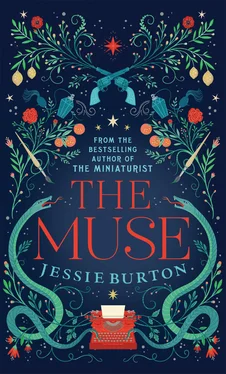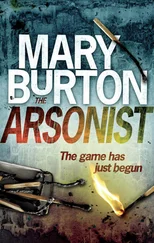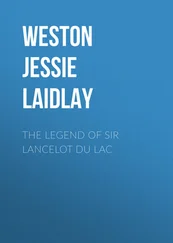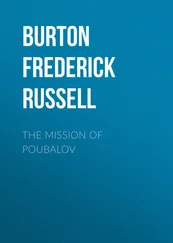I told Cynth how I’d forgotten the smell of the Dolcis stock cupboard. ‘It’s as if one week can kill five years,’ I said, determined and rhapsodic about my transformation. I told her about Pamela, and joked about the rigidity of her beehive. Cynth paused, frowning, for she was frying me an egg in our tiny flat, and the hob was unreliable. ‘I pleased for yuh, Delly,’ she said. ‘I pleased it going so well.’
On the Friday of the first week, Reede’s letters completed, I was struggling with a poem in a quiet half-hour. Cynth had told me that the only thing she wanted as a wedding gift was ‘something written — seeing as you’re the only one who ever could.’ Touched but agonized, I stared at the Skelton’s typewriter, thinking how happy Sam and Cynth clearly made each other. It made me think about my own lack; the foot, but no glass slipper. It also made me realize how I had been struggling with my writing for months. I hated every word that came from me, couldn’t let any of it breathe.
A woman walked in just as I lit upon a possible phrase. ‘Hallo, Miss Bastien,’ she said, and the idea melted away. ‘Getting on? Allow me to introduce myself. I’m Marjorie Quick.’
I stood, knocking the typewriter in my haste, and she laughed. ‘This isn’t the army, you know. Take a seat.’ My eye darted to the poem on the reel, and I felt sick to my stomach that she might walk round and see it.
Marjorie Quick came towards me, hand outstretched, her gaze flicking to the typewriter. I took her hand, willing her to stay on the other side of the desk. She did, and I noticed the cigarette scent that clung to her, mingled with a musky, masculine perfume that I recognized from the letter she’d posted, and I would later learn was called Eau Sauvage.
Marjorie Quick was petite, upright, dressed in a way that eclipsed Pamela’s efforts. Wide black slacks that billowed like a sailor’s as she walked. A pale-pink silk blouse with a grey satin necktie loosely slung inside it. She looked like something out of Hollywood, with her short, silvering curls, her cheeks seeming carved from a fine honeyed wood. She could have been in her early fifties, I supposed, but looked unlike any fifty-year-old I’d ever met. Her jawline was sharp and her glamour hovered.
‘Hello,’ I said. I couldn’t stop staring at her.
‘Any bother?’ Quick seemed to feel the same, fixing her dark liquid irises on me, waiting for my answer. I noticed she looked rather flushed, a bead of perspiration on her forehead.
‘Bother?’ I repeated.
‘Good. What time is it?’ The clock was behind her, but she didn’t turn.
‘Nearly twelve-thirty.’
‘So let us lunch.’
She had her name engraved on a brass plate upon her door. I wondered how many women in London, in this year of our Lord 1967, had their own office. Working-class women had menial jobs, or nursed in the NHS, or were factory or shop girls or typists like me, and it had been like that for decades. But there was a world of difference, an almost unnavigable journey, between that and having your name engraved on the door. Perhaps Marjorie Quick was a scion of the Skelton family, here in some honorary position.
She opened the door, the nameplate glinting in the rays of sun through the window beyond, and ushered me inside. Her room was white and airy, with huge windows looking onto the square. The walls were bare of paintings, which I thought odd, being where we were. Three were covered in bookshelves and I spied mainly nineteenth- and early-twentieth-century novels, the surprise combination of Hopkins perching next to Pound, and a smattering of Roman history. They were all hardbacks, so I couldn’t see if the spines were bent.
From her large desk, Quick grabbed a packet of cigarettes. I watched as she extracted one, hesitated, and then placed it delicately on her lips. I would become accustomed to her habit of speeding up her actions, only to slow them again, as if checking herself. Her name lived up to her, but whether it was her languorous or hasty side that was more natural was always hard to tell.
‘Would you like one?’ she asked.
‘No, thank you.’
‘Then I’ll go on alone.’
Her lighter was one of those heavy, refillable silver varieties, to be left on a table rather than slipped in a pocket. It was the kind of thing you might see in a country house, a cross between a hand grenade and something up for auction at Christie’s. The Skelton had a lot of money, I reckoned, and Quick reflected it. Unspoken, but present, it was in the cut of her pink silk blouse, her brave trousers, her smoking paraphernalia. In her. I wondered again what exactly her role here was.
‘Gin?’ she said.
I hesitated. I never drank much, and I certainly did not like the taste of spirits. The smell reminded me too much of the men in the Port of Spain clubhouses — the bubble of rum through the blood, working to a roar of squalid pain or euphoria heard upon the dust roads into town. But Quick unscrewed the cap of the gin from a table in the corner and poured some into two tumblers. She delved in an icebox with a pair of tongs and dropped two cubes in my glass, splashed it with tonic to the top, added a slice of lemon, and handed it to me.
Sinking down into her chair as if she’d been standing for twenty days, Quick slugged back her own gin, picked up the telephone receiver and dialled a number. She sparked the lighter and a fat orange flame appeared. The end of her cigarette sizzled, tobacco leaf crisping into tendrils of blue smoke.
‘Hello, Harris? Yes, whatever it is today. But twice over. And a bottle of the Sancerre. Two glasses. How long? Fine.’ I listened to the cadences of her voice; clipped and husky, it didn’t sound entirely English, even though it had hints enough inside it of a draughty boarding school.
She placed the receiver back down, and flicked her cigarette into a giant marble ashtray. ‘The restaurant next door,’ she said. ‘I find it impossible to sit inside it.’
I sat down opposite her, cradling my glass, thinking of the sandwich Cynth had made for me, its edges curling in the heat of my desk drawer.
‘So,’ she said. ‘A new job.’
‘Yes, madam.’
Quick placed her glass on the desk. ‘First things, Miss Bastien. Never call me “madam”. Nor am I “miss”. I like to be known as Quick.’ She smiled, looking rueful. ‘Your name is French?’
‘Yes, I believe so.’
‘You speak French?’
‘No.’
‘To have and to be confuse me greatly. I thought people spoke French in Trinidad?’
I hesitated. ‘Only a few of our forebears were indoors, speaking with the French,’ I said.
Her eyes widened — with amusement, offence? It was impossible to tell. I dreaded that my history lesson was too much, too arch, and I was going to fail my trial period. ‘Of course,’ she said. ‘How interesting.’ She took another slug of gin. ‘There’s not much to do here at the moment,’ she went on, ‘but I expect Mr Reede is keeping you busy with his endless flow of correspondence. I’m worried you’ll be bored.’
‘Oh, I’m sure I won’t be.’ I thought of Dolcis, of how they overworked Cynth and me; the way the husbands watched our buttocks whilst their wives slipped on their heels. ‘I’m just so pleased to be here.’
‘There’s probably more life to be seen in one day at Dolcis Shoes than a week at the Skelton. Did you enjoy it?’ she asked. ‘Touching all those women’s feet?’
The question was vaguely shocking, rimed with a sexual sharpness that stung me, virginal as I was. But I would not be cowed. ‘In all honesty,’ I replied, ‘with thirty pairs a day, it was appalling.’
She threw back her head and laughed. ‘All the cheeses of France!’
Читать дальше












